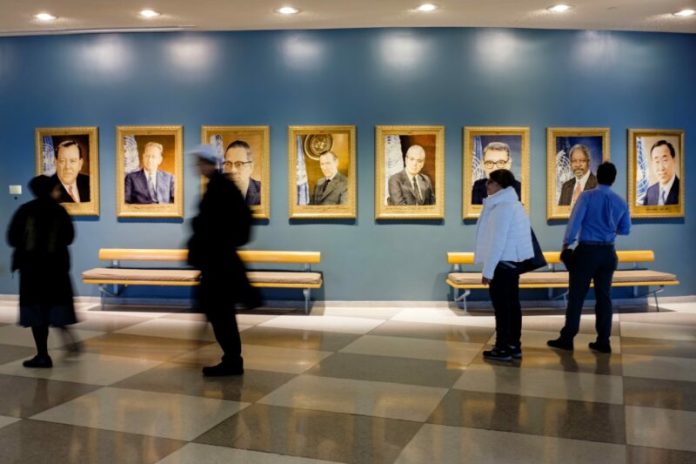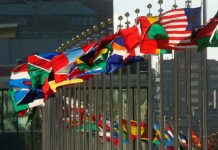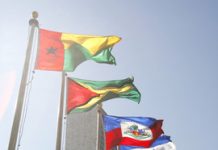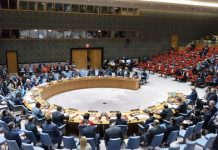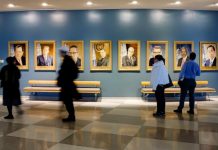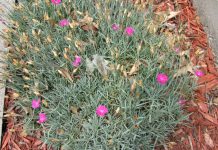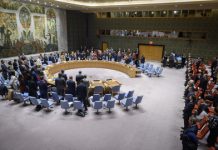Given the brutality of the recent conflict in Gaza between Hamas and Israel, it has become increasingly difficult to imagine a durable peace. Yet, that remains the aim of a remarkable grassroots organization called Combatants for Peace.
The organization, which has been nominated for two Nobel Peace Prizes, is made up of Israelis and Palestinians who once embraced violence but have since turned to peace and dialogue as the only solution to healing the wounds of both communities.
Several of the members of Combatants for Peace were invited to UN Headquarters at the end of January by the UN Office of Rule of Law and Security Institutions, including Mai Shahin and Elik Elhanan.
Ms. Shahin, a Palestinian peace activist and therapist with over 12 years of experience on conflict resolution, fought against Israel in the Second Intifada, a major uprising of Palestinians in the occupied territories which begin in the year 2000.
Elik Elhanan is a teacher at City College of New York. In the late 1990s, he served in an Israeli Special Forces unit. In 1997, his 14-year-old sister was killed in Jerusalem by a suicide bomber.
During their visit, they shared their stories with Conor Lennon from UN News, who started by asking them if dialogue between the members of Combatants for Peace has become more difficult, given the intensity of the conflict between Israelis and Palestinians.
This interview has been edited for clarity and length.
Mai Shaheen: Even though there might be disagreements, dialogue has been one way of solving and ending the occupation for many years, so it is normal for me to be sitting with another human being who just happens to be Israeli Jewish.
Elik Elhanan: Combatants for Peace has been around for a while. The 7 October 2023 attacks and the subsequent violence and crimes against humanity in Gaza tested our mettle. But it wasn’t our first test of this sort.
We’ve been trying to find a way to communicate and dialogue since 2005. There is no absence of conflict, but we try to live with it and around it. Over the last 20 years, this has become my community. These are my brothers and sisters. These are my peers. These are the people I go to when I need advice. And these are the people I go to when I need support.
I trust Mai and I trust the other Palestinian members. We’re grieving for two communities and fighting for two communities. As a result of our long engagement together, this feels natural.
UN News: But have the conversations between Combatants for Peace in the two communities changed since 7 October?
Mai Shaheen: For us it was very clear, even on the day itself, that we had to meet. Now more than ever. Actually, the work we had been doing for so many years came to fruition on 7 October. We soon began discussing how to bring everything we have learned and worked for, and how to walk our talk in front of the Israeli and Palestinian community. There were many conversations and meetings, a lot of grieving and a lot of crying.
A car filled with belongings heads back to Rafah, in the southern Gaza Strip.
Non-violent dialogue has been one of the most crucial strategies that we have been using in Combatants for Peace. We don’t just talk about politics; we connect deeply with each other and allow the pain and the grieving to come.
As Palestinians, we held the space for the Israeli activists who were going from one funeral to another. They needed to come with their frustration, anger, pain and grief. And we understood that this is the time to show our communities that nonviolent resistance is actually the only way for both of us to live together as equals.
Elik Elhanan: I was in New York during the events of 7 October, and I was terrified for both communities. My family comes from the kibbutzim in the South. I know people in Gaza. Many of our members have families and friends in Gaza and we could feel that the Israeli reprisals would be insane and disproportionate and criminal. It was terrible.
I held on to one hope, that the Combatants for Peace would survive. As I said, this is not our first test, but it’s the worst, and there were many moments where we thought that the organization would not survive this level of atrocities.
It was the ability of members, usually from the Palestinian side, to stretch out a hand that saved the movement. So, even in this darkest of moments, a sliver of hope remains.
I lost my sister in 1997 to a Hamas suicide bombing. I am familiar with this side of the conflict, and I am familiar with being the aggressor of this conflict. I could never find a place of forgiveness for my actions and a place for my grief in Israeli society.
However, my Palestinian friends in Combatants for Peace were able to give me this space, and the fear of losing it was the worst fear I have ever experienced. And the joy that is still around is definitely what gives me hope in the everyday.
UN News: Can you remember if there was a particular moment when you decided that violence was not the answer?
Elik Elhanan: Ther was not a specific moment. It took time and patience and there were a lot of pangs along the way. After the murder of my sister, when I was in the midst of all the rage and pain, members of my unit and my commanding officer visited me. They didn’t have anything to say, any vision except more death, more killing.
I remember very clearly officers from my unit telling me to get over it quickly and come back to the unit. “You’ll feel like a whole person again. We’re going out to Lebanon. You’ll get even”. The Palestinians who killed my sister are from the area of Nablus. How is fighting Hezbollah in Lebanon going to alleviate my pain or redeem her death? What is this vision of a world completely dominated by senseless violence?
That transactional violence depressed me more than I can explain. I was in a violent and angry sort of depression for many years until during the Second Intifada. As a young student in Paris, I met Palestinian students and we started working together, and protesting against the violence. We insisted that dialogue and peace negotiations based on equality and justice are not dead. It’s in this moment that something opened up in me.
Mai Shaheen: 13 years ago I was fortunate to meet a community of Palestinians and Israelis who had the vision and the dream to live together. That was my first time meeting normal Israelis who are not military, who are not investigating me or terrorizing me at checkpoints.
I started reflecting on my own story and realized that, even when I chose violent resistance, my intention was not to kill. We have never had anything against the Jewish people or the Jewish nation. We are against occupation. We are against oppression. We are against the separation wall and the checkpoints. Our Israeli partners are saying the same.
Children and their families wait in Al Nuseirat, in the central Gaza Strip, for the green light to begin their journey back home to Gaza City and the northern areas, after 15 months of displacement.
UN News: Is the political class in Israel and Palestine listening to what you’re saying?
Mai Shaheen: We had a big solidarity campaign in August, and we were joined by members of from the Knesset. We hope to have more changemakers in politics.
Elik Elhanan: I should point out that the politicians that support us in the Israeli system are from the very far left of the political map. These are the Jewish and Palestinian members of the Communist Party and the coalition around it. Unfortunately, in mainstream Israeli political system, we have a lot of silent support, but few of them have the courage to support us openly and vocally.
I think that is because they believe we, as Israelis, need more unity, strength and togetherness. I think what we need is a principled opposition. We can see that in the popular reaction to our work both in Israel and in Palestine, and I hope that politicians both in Israel and around the world will follow.
UN News: The idea of a two-state solution, an Israeli and Palestinian state existing peacefully side by side, has been the United Nations position for decades. Is it still possible?
Mai Shaheen: The real solution is everybody living freely on one land, like in America or Europe, with Christians, Jews, Muslims, Buddhists, non-believers all living together freely and respectfully.
Elik Elhanan: Reality changes and perspective changes. In Combatants for Peace, we began building a joint political language for Israelis and Palestinians to function together in a single political system. This experience has changed me. I like sharing my political landscape with Palestinians, with their experience and their intelligence and their particular understanding of history and politics.
We don’t have a position paper on this subject. That is a job for others, possibly people in this building. We are here to say that the solution is through negotiation, and a peace process, not through violence, war, ethnic cleansing and genocide.
Anything is better than what’s going on now.
Source of original article: United Nations (news.un.org). Photo credit: UN. The content of this article does not necessarily reflect the views or opinion of Global Diaspora News (www.globaldiasporanews.com).
To submit your press release: (https://www.globaldiasporanews.com/pr).
To advertise on Global Diaspora News: (www.globaldiasporanews.com/ads).
Sign up to Global Diaspora News newsletter (https://www.globaldiasporanews.com/newsletter/) to start receiving updates and opportunities directly in your email inbox for free.


